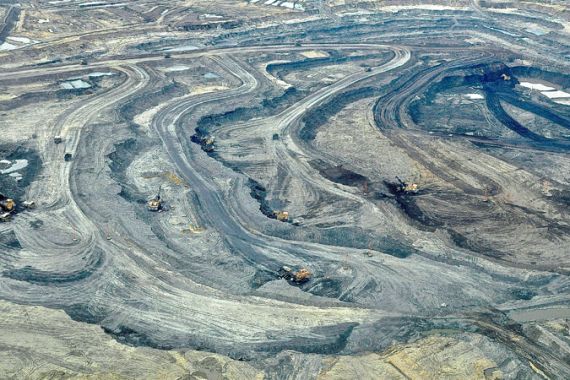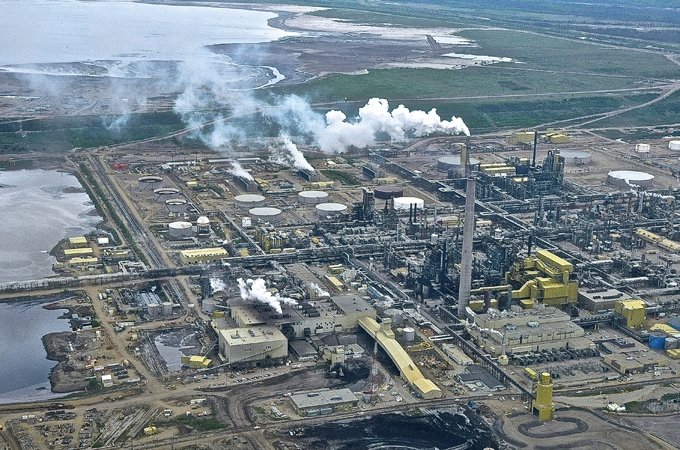Q&A: Canada’s oil sands linked to health woes
Al Jazeera sat down with John O’Connor, a doctor who first shed light on health problems near Alberta’s oil sands.

Fort Chipewyan, Canada – Dr. John O’Connor is the first physician to speak out about a possible adverse link between the oil sands and human health. While working in Fort Chipewyan, he became increasingly concerned about the growing number of rare cancers he saw among his patients in Fort Chipewyan.
Fort Chip, as it is more commonly known, is the oldest settlement in Alberta province. Located on the north shore of Lake Athabasca, it’s a community of fewer than 1,000 mostly First Nation and Metis people, also resides directly downstream from Fort McMurray’s renowned oil sands.
Keep reading
list of 4 itemsWoman, seeking loan, wheels corpse into Brazilian bank
UK set to ban tobacco sales for a ‘smoke-free’ generation. Will it work?
Poland lawmakers take steps towards liberalising abortion laws
When in early 2006, Dr. O’Connor suggested that cancer could be caused by the oil industry’s polluted runoff from the oil sands, “all hell broke loose”, as he put it.
He was accused of misconduct by Health Canada, and spent the following 2 years and eight months trying to clear his name and reputation. In the end, he was cleared of all charges. He has not changed his opinion and remains determined to find out what is making his patients sick.
|
|
| A battle between economy and environment |
This month, the Mikisew Cree First Nation and Athabasca Chipewyan First Nation in conjunction with the University of Manitoba, publicly released a report that shows an association between environmental contaminants from the oil sands and the declining health and well-being of people living in Fort Chip. Specifically, it shows the extent of heavy metals and other contaminants in country foods harvested by indigenous people in the region.
We spoke with him at the clinic in Fort McKay.
Al Jazeera: What is your latest reaction to this report?
John O’Connor: This is yet another scientific report, this time paid for by the community itself, that confirms again that the tar sands mining industry is having a severe adverse impact on Fort Chip, on traditional foods in this instance and with the cancers. The numbers have increased since the last tally was done. And it begs immediate action.
AJ: What came to your attention at first and why?
O’Connor: I started medical care in Fort Chipewyan in 2000. [Over time] I got to know the community, the stories I heard especially from the elders, about the changes in their environment over the past 15 years, were quite striking.
Then I got to know what their health was like, and from very well kept charts from the nursing station in Fort Chip, it was obvious that there was a sort of burden of illness in the community that I didn’t expect.
I began to accumulate test results that were of concern. Issues related to auto-immune diseases for instance, quite a bit of lupus and rheumatoid arthritis, which I didn’t expect, but also cancers in numbers and of types that I really couldn’t explain.
I talked to my colleagues in Fort McMurray, some of the specialists about this issue and if in their experience, they’d seen what I was seeing.
What I got back from the specialists who I deal with on a regular basis was that yes, there is a burden of illness in the community, you’re right, and I brought it to the attention of the authorities, as is my duty.
AJ: You faced a bit of a fight back then
O’Connor: All hell broke loose, media-wise, which in the end was a blessing because I’d definitely stirred the pot and made the people in authority react. The initial reaction was really bizarre. In March of 2006, three physicians from Health Canada came up to Fort Chip; they landed and came to the nursing station. The senior physician came into the nursing station, grabbed a mug, filled it with water from the tap, took a big mouthful, put it down and turned to the station staff and the reporter and said, “you see, there’s nothing wrong with the water here in Fort Chip”. And from that point on, there’s been sort of a stance taken – there isn’t an issue.
In early 2007, I got a letter in the mail, complaints from Health Canada and Alberta Health about my activity. It was a series of 4 to 5 charges, including “raising undue alarm” in Fort Chip. So I answered those charges, provided the evidence. It took two years and eight months to deal with those and in the end the College of Physicians felt that I was not reporting the information the way I should have been. Sort of siding with Health Canada and their contingent yet if I was guilty, I should have had some sort of sanction but I didn’t.
AJ: In the meantime, what’s been done?
O’Connor: In response to continued pressure, the Cancer Board in Edmonton decided they would do a study of cancers in Fort Chip. It took a year to produce the report that indicated quite clearly that indeed there was a burden of cancer in the community that would warrant investigation, so they recommended a comprehensive health study, as well as monitoring.
 |
|
The chairperson overseeing a health study in Fort Chip suggested that industry be involved in the investigation [Jet Belgraver/Al Jazeera] |
A scientific team was put together, comprised with representation from First Nation, from the feds and the province, myself and another doctor. The chair of this committee suggested that industry should be part of the management oversight committee, which was really weird. Potentially, industry could be the cause of some of the illnesses in the community, given the traditional knowledge of impact, of the environmental changes that clearly seemed to suggest that it was related to the expanding industrial area upstream.
The excuse we got was that industry may well be asked to fund the study, which was totally unacceptable. The community said no, take industry out of the equation or we’re not doing it. And the province and the feds walked away. And there’s been nothing but denial ever since.
AJ: Why is this being ignored?
O’Connor: The fact that the communities are aboriginal, I think, is very significant.
A sacrificial zone as we call it.
If this industry was sighted downstream of Edmonton, or upstream of Edmonton or Calgary, guaranteed there would have been an uproar.
There are sort of two levels of care and aboriginal communities are not even in the equation.
If anyone in public health cared a whit, if they were doing their job at all, they would have said a long time ago, stop. We can’t allow this to go on. We have to figure out what’s going on. It’s our duty to investigate this.
I’m often a voice in the wilderness. My duty as a family doctor is to advocate for my patients. I simply stood up and said “what … is going on?” And I got shot down.
AJ: Do you feel like no one is listening?
O’Connor: No I don’t. The people that know what’s going on and actually caring and willing to stand up, those numbers are increasing. The government and the very persistent and very inappropriate reaction – ignoring the message and the messengers and turning the other way all the time – it has served to unite people. And in unity, there’s strength. The amount of support that’s out there is huge.
AJ: What do you think it would take?
O’Connor: At this point in time I am thoroughly convinced, and I am not the only one, that an independent public inquiry is needed about this whole attitude and the way the community has been treated.